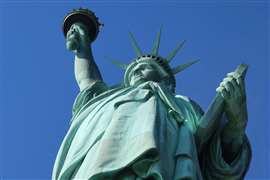Economic change
15 April 2008
The US election that enabled Democrats to regain from Republicans control of both houses of Congress for the first time since 1994 has been viewed around the world as a referendum on Iraq, with the American public voicing a clear displeasure with the policies of the George W. Bush administration. Less obvious is what this reshaping of the political landscape in Washington, D.C. will mean for the global economy. Two months before the election, the highly regarded German Marshall Fund released its annual survey showing that 77% of Europeans in a dozen nations disapproved of the way Bush has handled international affairs. However, a mere ten days after the election, Stephen Roach, Morgan Stanley chief economist, returned from a quick “spin around the globe” to report that, “The world is nervous about the implications of America's stunning political upheaval.”
A number of economists forecast that US trade policy will be more protectionist than it has been under Republican domination. Indeed, many of the Democrats who won in the recent elections took the position that US free-trade agreements were job killers.
They most likely will feel compelled to follow up on that position at the urging of labour unions, which produced record participation in the 2006 campaign. The unions contacted 13.4 million voters in 32 hotly contested states and supplied 187,000 volunteers to help Democrats match the Republican's far better financed get-out-the-vote machine.
A week after the election, James Oberstar, the 32-year veteran of Congress from Minnesota who was already presumed to be the next Chairman of the House Transportation and Infrastructure Committee, announced in a press conference that he would fight all efforts to allow Mexican trucks open access to US roads, as required under the North American Free Trade Agreement. Mexican trucks and their drivers have not proven safe enough to allow beyond the narrow commercial zone north of the Mexico-US border, according to Oberstar.
This does not seem to be an isolated incident. Congressional aides and government officials say the new leaders in Congress will insert safety, labour and environmental protections into numerous pending trade treaties and direct the Bush administration to adopt similar measures in future pacts it negotiates.
Republicans historically have opposed such restrictive provisions in treaties, saying they are against the interests of US businesses and consumers. Democrats, however, are well aware that at least some of their support in the recent election resulted from disenchantment over US job losses. Some of the Democrats' greatest successes were in the Midwestern and Northeastern states where there were the most job losses, including those moving overseas.
Although Democrats feel strongly about such issues, many economists forecast that they will have far less power than they imagined. Because global forces have taken control of the economy, the US government, regardless of party, will have less influence than ever, according to the cover story in the 20 November issue of BusinessWeek.
Consider, for example, the Democrat's pledge to boost the minimum wage. Such a move would help only a small fraction of the workforce and would do almost nothing to counter the weak wage growth faced by most Americans, including college graduates, in recent years.
“The broad-based drop in income is being driven more by the rise of China and India and the intensification of global competition,” according to BusinessWeek. “And there is little Democrats can do to reverse these trends.”
Increasingly, what may look like international competition is really co-operation. Consider that foreign money now finances about 32% of US domestic investment, up from 7% in 1995. Meanwhile, money also flows freely to other countries. China has become the world's top investment destination, accounting for US$79.1 billion of $177 billion in foreign direct investment attracted by developing Asian countries in 2005.
As the association that helps worldwide members to safely transport, lift and erect oversize and overweight items, SC&RA generally welcomes a move toward a global economy. The challenge for us is to monitor important international economic trends and to help our members understand what they mean for their businesses.



